Black Cowboys in the Wild West and African-American soldiers in WW2
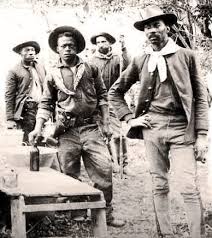 There are facts we don’t know and facts we choose not to know because they don’t suit us. There are facts that are hidden from us by politicians and power-hungry people and there are facts which are distorted by the media, by myth-makers, advertisers and film makers. When it comes to war and war stories the facts may be so extremely complex and convoluted that they are manipulated or simplified “for our own good”!. At the same time, writers, film-makers and artists, by telling stories, can and do remind us of what really happened and why it matters. It stands to reason, for example, that freed slaves would be as likely to seek their fortunes in the Wild West as German and Irish immigrants. It hadn’t occurred to me that there once were black cowboys until I saw Mel Brooks’ outrageous film Blazing Saddles
There are facts we don’t know and facts we choose not to know because they don’t suit us. There are facts that are hidden from us by politicians and power-hungry people and there are facts which are distorted by the media, by myth-makers, advertisers and film makers. When it comes to war and war stories the facts may be so extremely complex and convoluted that they are manipulated or simplified “for our own good”!. At the same time, writers, film-makers and artists, by telling stories, can and do remind us of what really happened and why it matters. It stands to reason, for example, that freed slaves would be as likely to seek their fortunes in the Wild West as German and Irish immigrants. It hadn’t occurred to me that there once were black cowboys until I saw Mel Brooks’ outrageous film Blazing Saddles
D-Day landing on the beaches of Normandy – Omaha, Juno, Utah, Gold and Sword
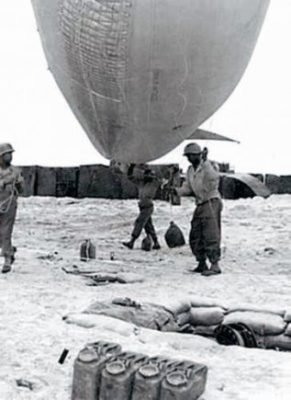
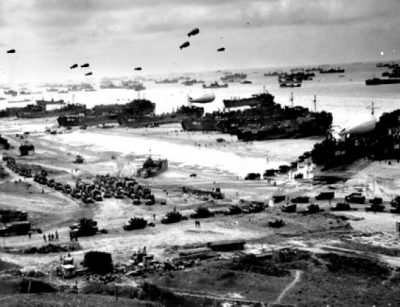 I quote from Texas Democrat Marc Veasey – “It is a fact that too few know: 75 years ago, it was American soldiers of every race that hit the beaches of Normandy. 75 years later, it is our duty to remember and honor the courage of these men. As the world hung in the balance, it was the sacrifices of ordinary Americans that saved our democracy. This is made all the more remarkable – and tragic – by the fact that for many of the Americans who served on D-Day, our democracy was not yet one they could participate in.” Think of that – Americans fighting for freedom and democracy that was denied their own citizens. These are stories yet to be told and yet to be made into films.
I quote from Texas Democrat Marc Veasey – “It is a fact that too few know: 75 years ago, it was American soldiers of every race that hit the beaches of Normandy. 75 years later, it is our duty to remember and honor the courage of these men. As the world hung in the balance, it was the sacrifices of ordinary Americans that saved our democracy. This is made all the more remarkable – and tragic – by the fact that for many of the Americans who served on D-Day, our democracy was not yet one they could participate in.” Think of that – Americans fighting for freedom and democracy that was denied their own citizens. These are stories yet to be told and yet to be made into films.
Representative Marc Veasey also says – “Over 900,000 African-Americans served in the United States military during World War II, and all in segregated units. You may have heard of the Tuskegee Airmen of the 332nd Fighter Group and the 477th Bombardment Group or the 761st Tank Battalion, who led the way into Germany. But largely forgotten today is the 320th Barrage Balloon Battalion: an all-black unit that went ashore with everyone else on D-Day.”
Fighting for Freedom and Democracy in Europe – and for the British Empire
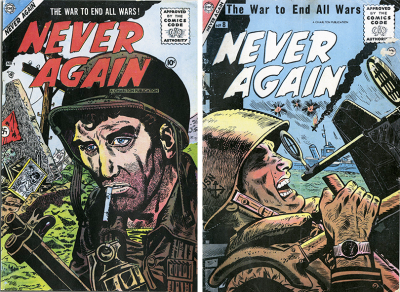 As all of my generation did, I grew up on comics and films about the white British heroes who beat the Nazis in Europe, yet I was a colonial child in Africa who was kept safe in my home country by police and the soldiers among whom were black men under white officers. The fact that African soldiers served in the British Army in Burma seems to have been forgotten by the British. Griff Rhys Jones, however, has made a documentary about the men who served under his father. My father was part of that regiment but served in East Africa, not Burma. We need more stories like this to provide us with different points of view.
As all of my generation did, I grew up on comics and films about the white British heroes who beat the Nazis in Europe, yet I was a colonial child in Africa who was kept safe in my home country by police and the soldiers among whom were black men under white officers. The fact that African soldiers served in the British Army in Burma seems to have been forgotten by the British. Griff Rhys Jones, however, has made a documentary about the men who served under his father. My father was part of that regiment but served in East Africa, not Burma. We need more stories like this to provide us with different points of view.
Does it matter if our stories are not truthful?
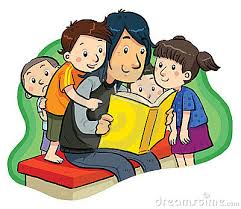 I’m a storyteller, yet when I was a child my parents told me not to ‘tell stories’. That meant several things. It meant ‘don’t tell fibs’. It meant ‘be honest’. It meant ‘don’t brag’. It meant ‘don’t embroider the facts’. It meant don’t tell ‘tales’ or ‘incriminate other people’. I think all of that turned out to be very good advice for any writer, whether of fiction or non-fiction. I don’t think that good stories are ‘propaganda’ for a particular point of view. I can’t escape from the person I am or from what history has made me or from what I have come to think of as my core beliefs but I do think that readers shouldn’t be fooled or misled. Readers exercise judgement for themselves and that’s not about good or bad taste in books, either. My characters aren’t sterotypes and, as I don’t want to ‘lecture’ my readers, it will only be my characters who will show you their worlds.
I’m a storyteller, yet when I was a child my parents told me not to ‘tell stories’. That meant several things. It meant ‘don’t tell fibs’. It meant ‘be honest’. It meant ‘don’t brag’. It meant ‘don’t embroider the facts’. It meant don’t tell ‘tales’ or ‘incriminate other people’. I think all of that turned out to be very good advice for any writer, whether of fiction or non-fiction. I don’t think that good stories are ‘propaganda’ for a particular point of view. I can’t escape from the person I am or from what history has made me or from what I have come to think of as my core beliefs but I do think that readers shouldn’t be fooled or misled. Readers exercise judgement for themselves and that’s not about good or bad taste in books, either. My characters aren’t sterotypes and, as I don’t want to ‘lecture’ my readers, it will only be my characters who will show you their worlds.
The last stories of the men and women who served in WW2
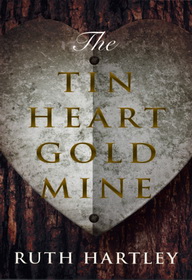
“The Tin Heart Gold Mine” by Ruth Hartley. Cover design by Terry Compton Design
There were some very moving stories told by the old men and women at the 75th Remembrance Ceremony. They were stories told with the humility that time gives us about our history. Time gives us perspective on events. I was particularly affected by the encounter between a German and a British soldier at the ceremony. Their shared stories bear a strong relation to the themes and stories in my book The Tin Heart Gold Mine . Both my first two novels have a war background about the way European conflicts have impacted on Africa over hundreds of years. Storytelling is of enormous importance in keeping alive values that we all care about – freedom, democracy and kindness.
7 Comments on “Stories about wars that stop us remembering to forget”
Much food for thought here on the D-Day landings and the participation of the African-Americans. So true (and ironic) that they were sent to fight for freedom and democracy that they themselves were in fact denied.
Lest we forget
I did think of the West Indian/Carribean soldiers who were later invited to come and live in Britain and work on the buses and the trains and yet were subjected to racism. The history is all so mixed up isn’t it? I wondered if I should have made the post about them rather than the Americans but in fact – I don’t know where they served in the war!
You’re right that there are lots of war stories we don’t tell and there were many people involved in WW2 that are not sufficiently remembered or honoured.
I have just written half a book on the Liberation of Europe (1943-5) – to be published shortly:
https://www.amazon.co.uk/Rough-Guides-Travel-Liberation-Europe/dp/178919430X/ref=sr_1_1?crid=3SMTBSD7R4T36&keywords=liberation+route+europe&qid=1559987301&s=gateway&sprefix=liberation+routes%2Caps%2C182&sr=8-1
My co-author and I were very wary of falling into the usual narrative of “the British and the Americans won the war with only a little help from other nations”. Even the smallest war is more complicated than it appears and every army has its sub-groups. In the book we have a double page feature on all the nationalities and groups involved in the war, notably black Americans, who had to face discrimination even while serving their country, and colonial troops from the French and British empires. Every army in the war was nothing if not heterogeneous, and not everyone in any given was fighting for exactly the same aims. The defeat of Nazism was a common objective for the Western Allies, of course, but many soldiers were also fighting, they hoped, for postwar freedom. The average commemoration reduces everything to simple patriotism, and good and bad. We do well to remember that there was a lot more to the war than some people would have us believe.
I am really delighted that you posted this information about your new book Nick! I look forward very much to buying and reading it. Its so true that wars are much more complicated than we can ever grasp. I hope you get some deserved publicity from your comment here. I loved the Jewel in the Crown series by Paul Scott because of what they said about the war fought by Indian conscripts and of course the complications around those in India who wanted independence from the British Empire and then of course there was the tragic and terrible fall out from Partition – all dealt with in those books – they also come into Salman Rushdie’s Midnight’s Children – a wonderful book. The other interesting war stories are the Balkan Trilogy by Olivia Manning
Striking that the only generation almost as much in favour of the EU as the millennials are the people who actually fought in the war.
https://www.independent.co.uk/news/uk/politics/brexit-vote-d-day-anniversary-veterans-ww2-eu-europe-a8946046.html?fbclid=IwAR3H3GtSjdq9e-REvWl9G1fmW8rHhMbKnT0Cue8vNFl4upuqO1HYlHFL358
Thanks for your comment, Anne. It does seem true that it’s those who have no firsthand knowledge of war who romanticise it and like to take up nationalistic and militaristic attitudes about their identity and their nations and patriotism. Its wriers writing about the wars they have survived who give us the best ideas of why war should be avoided if at all posible. There are other interesting comments about this post which are really pleasing. I love an exchange of ideas.
Yes it is Anne – I wonder what created that similarity – you might expect those who fought in the war to hate the places where they battled but they seem to have found it necessary to believe that they were fighting for freedom and democracy in all of Europe. Younge people see themselves as citizens of the world I suppose!